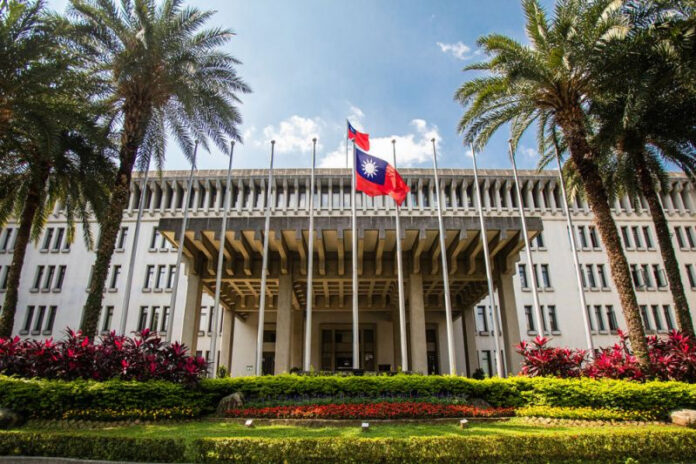Taiwan’s foreign ministry has responded firmly to a statement from China’s foreign ministry, clarifying that Singapore adheres to a “one-China policy” but does not align with China’s “one-China principle.” The statement follows recent comments made after a meeting between Singaporean Prime Minister Lawrence Wong and Chinese President Xi Jinping, sparking diplomatic discussions about Taiwan’s status in international relations.
Key Diplomatic Discrepancy
During the Asia-Pacific Economic Cooperation (APEC) summit in Peru, a meeting took place between Prime Minister Wong and President Xi on November 15, 2024. Afterward, the Chinese foreign ministry issued a statement declaring that “Singapore fully understands the Chinese government’s position on the Taiwan question, opposes any form of ‘Taiwan independence,’ and firmly abides by the one-China principle.”
However, Singapore’s own foreign ministry countered this claim, reaffirming its “one-China policy,” stating that Singapore opposes Taiwan independence but does not endorse China’s “one-China principle” as a legal or political doctrine.
What is the One-China Principle vs. One-China Policy?
- One-China Principle: This is the stance held by China, asserting that there is only one China and that Taiwan is an inseparable part of it. The PRC claims sovereignty over Taiwan, and this position is typically accepted by countries that recognize the PRC as the legitimate government.
- One-China Policy: This term refers to a broader, more flexible policy held by countries that acknowledge the existence of one China but do not explicitly endorse the PRC’s claim over Taiwan. Many countries, including the U.S. and Singapore, adopt this approach to maintain diplomatic relations with both Beijing and Taipei.
| Term | Definition | Examples |
|---|---|---|
| One-China Principle | PRC’s assertion that Taiwan is a part of China and under its sovereignty | China, Russia, and other PRC allies |
| One-China Policy | Acknowledges one China but does not assert that Taiwan is part of the PRC | United States, Singapore, Japan |
Taiwan’s Strong Response
In response to the conflicting statements, Taiwan’s Deputy Foreign Minister Tien Chung-kwang pointed out that China had once again misrepresented Singapore’s position, a move he described as part of Beijing’s broader “disinformation warfare.” Tien clarified that Singapore’s “one-China policy” is consistent with its longstanding diplomatic stance and does not equate to acceptance of the “one-China principle.”
Tien emphasized that Taiwan’s government stands by the position that international recognition of its sovereignty is crucial. The distinction between policy and principle, he argued, is vital to understanding Taiwan’s international standing.
Global Perspective on the One-China Issue
The issue of Taiwan’s status is a sensitive topic in international diplomacy, and the varying interpretations of the “one-China” framework reflect different countries’ diplomatic priorities. Taiwan’s relations with its allies, including Singapore, the U.S., and Japan, are often characterized by nuanced positions that acknowledge China’s claims without fully accepting them.
For example, the United States follows its own “one-China policy” based on the Taiwan Relations Act, which allows it to maintain unofficial relations with Taiwan while formally recognizing Beijing as the sole legal government of China.
Conclusion: Implications for Taiwan’s International Relations
Taiwan’s rejection of China’s claim that Singapore adheres to the “one-China principle” highlights the complexities surrounding cross-strait relations and the global discourse on Taiwan’s sovereignty. As countries like Singapore navigate delicate diplomatic balances, the international community continues to debate the best path forward for Taiwan’s status in the world.
FAQs
1. What is the difference between the One-China Policy and the One-China Principle?
The One-China Policy acknowledges that there is one China but does not assert that Taiwan is part of the PRC. In contrast, the One-China Principle directly asserts that Taiwan is an inalienable part of China, as claimed by Beijing.
2. Why did Taiwan react to Singapore’s statement?
Taiwan responded because it believes that China’s statement misrepresents Singapore’s position, which emphasizes the “one-China policy” rather than Beijing’s strict “one-China principle.”
3. How does the One-China Policy affect Taiwan’s relations with other countries?
Many countries adopt the One-China Policy to maintain diplomatic relations with both China and Taiwan, but they do not necessarily support Beijing’s claim over Taiwan. This policy allows for unofficial relations with Taiwan while officially recognizing the PRC.
4. What is disinformation warfare in the context of Taiwan’s international relations?
Disinformation warfare refers to efforts by Beijing to manipulate or distort the facts surrounding Taiwan’s sovereignty to influence global perceptions and undermine Taiwan’s international presence.
5. Does Singapore support Taiwan independence?
No, Singapore opposes Taiwan independence but maintains a position that does not align with China’s claim that Taiwan is a part of China.
